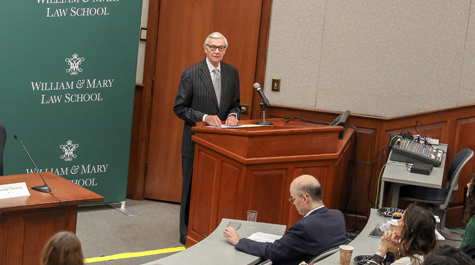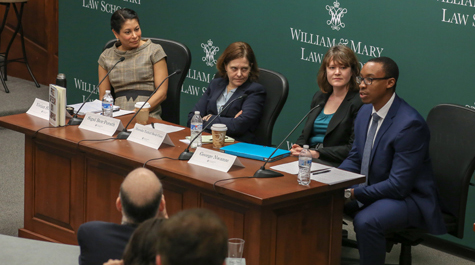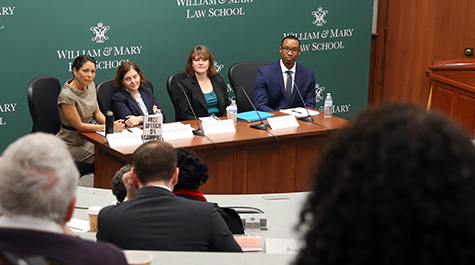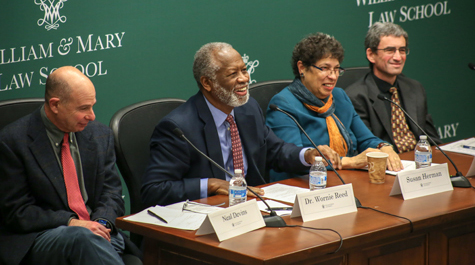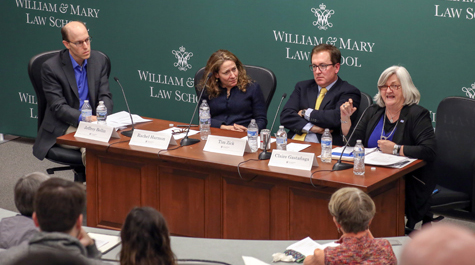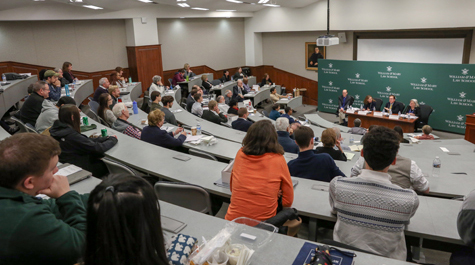William & Mary Law School and ACLU of Virginia examine “The First Amendment under Fire”
Are First Amendment speech protections under attack? Can colleges and universities provide learning opportunities that value all students equally and also value free expression? How can law enforcement safeguard speech while protecting public safety?
These were just some of the many topical questions considered during “The First Amendment under Fire: A Symposium on Speech, Protest, and the Role of State Actors,” held at William & Mary Law School on February 2.
Open to students, academics and the general public, the day-long event was co-sponsored by William & Mary Law School and the American Civil Liberties Union [ACLU] of Virginia, and made possible with the assistance of the William & Mary student chapter of the American Constitution Society.
“I think it’s fitting that these conversations are going to occur in the halls of our country’s oldest law school…created by Thomas Jefferson and George Wythe in 1779 to engage complex, difficult issues of public policy,” said William & Mary President Taylor Reveley in introductory remarks.
Reveley added that “competing views can be advanced and debated amid civility in a law school that has as one of its missions to prepare students to participate effectively in the political life of our country.”
Civil debate and hearty question-and-answer sessions with attendees were indeed the order of the day in three panel discussions, the first of which tackled the hot-button issue of “Speech on Campus.” Moderated by event coordinator Vivian Hamilton (W&M Law School), the panel included Sigal Ben-Porath (University of Pennsylvania Graduate School of Education), Marieke Tuthill Beck-Coon (Foundation for Individual Rights in Education [FIRE]), and George Nwanze (W&M Law School Class of 2019).
The subject was, unsurprisingly, far from straightforward, with philosopher Ben-Porath arguing that a framework for free speech on campus should be educational and relational rather than legal. Beck-Coon, on the other hand, worried that that would lead to universities policing speech.
A second-year law student, Nwanze shared his conception of the First Amendment before beginning the study of law, then after studying the doctrine in upper-level courses in First Amendment—Speech and Education Law. Nwanze explained that he had initially shared the popular media conception that individuals have the same speech rights wherever they may happen to be, to a more complex and refined understanding of speech doctrine.
“I first realized that although I can exert my First Amendment right, it can’t be used to restrain virtually everyone; it’s largely used as an implement for restraining government action and preventing the government from taking a course of action,” he said. “It’s not a prophylactic measure that confers an affirmative right, but rather something that prevents my right from being restrained.”
The second panel, moderated by Neal Devins (W&M Law School), sought to answer the question “Can Racial Justice and Hate Speech Co-Exist?” Panelists included Susan Herman (President, ACLU and Professor of Law, Brooklyn Law School), Alexander Tsesis (Loyola-Chicago School of Law), and Dr. Wornie Reed (Virginia Tech).
The final panel, moderated by Jeffrey Bellin (W&M Law School), looked at “Policing Protests,” and included Claire Gastañaga (Executive Director, ACLU of Virginia), Rachel Harmon (University of Virginia School of Law), and Timothy Zick (W&M Law School).
Susan Herman, President of the ACLU, was impressed by the range of topics and willingness to share differing views. “I thought that today’s conference was an incredibly good demonstration of freedom of speech,” she said.
After the contentious August 2017 Unite the Right rally in Charlottesville, Va., symposium co-organizer Claire Gastañaga found herself heartened by the symposium’s thoughtful and considered conversation about difficult, complex issues.
“There have been times in the past when it was easier to be an advocate for the First Amendment, and there are definitely changes that have taken place that make it hard to understand exactly how one assures the public safety and the public right to speak, and those are issues that we are going to be wrestling with for some time in the future,” Gastañaga said. “So wrestling with them in this kind of atmosphere is really good.”
Nwanze said that working alongside well-known experts was “a really humbling experience.”
“Their background and depth of knowledge is astoundingly impressive; their knowledge of the First Amendment has really been helpful and insightful in framing questions that I’ve had personally about how speech operates on campus and how it operates further in broad society,” Nwanze said. “This has been very educational, sort of the quintessential, law school experience I hope to have.”
About William & Mary Law School
Thomas Jefferson founded William & Mary Law School in 1779 to train leaders for the new nation. Now in its third century, America's oldest law school continues its historic mission of educating citizen lawyers who are prepared both to lead and to serve.
